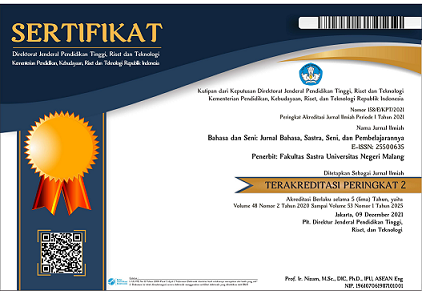POWER AND GENDER OPPRESSION IN LAUREN WEISBERGER’S THE DEVIL WEARS PRADA AND SETH GRAHAM SMITH’S PRIDE AND PREJUDICE AND ZOMBIES
Abstract
Abstract: This study aims to analyze (1) what power is exercised in The Devil Wears Prada and Pride and Prejudice and Zombies, (2) how power operates gender oppression, and (3) how power plays an important role in gender oppression in the novels. Marxist-Feminist approach is used to analyze the data by applying Engels’s theory of power, Young’s theory of gender oppression, Marx’s, Engels’s and Lenin’s theory of liberation. The result has found out that all the indicators of the exercise of power by the ruling class are present in both novels. In relation to gender oppression, the female character in The Devil Wears Prada suffers from exploitation, marginalization, powerlessness, and cultural imperialism in the workplace. Meanwhile, some female characters in Pride and Prejudice and Zombies suffer from all the forms of gender oppression as the impact of the exercise of power in their social life. However, almost all elements of women liberation mostly is revealed in the novels.
Permalink/DOI: dx.doi.org/10.17977/um015v45i22017p121
Full Text:
PDFReferences
Allen, A. 2016. Feminist Perspective on Power E. N. Zalta (Ed.) Retrieved from url{https://plato.stanford.edu/archives/fall2016/entries/feminist-power/
Bardwaj, N. 2016. Maxim Gorky's Mother through the Lens of Marxist Feminism. International Journal on Studies in English Language and Literature ( IJSELL), 4(7 July 2016), 33-36.
Barrett, M. 2014. Women's oppression today: The Marxist/feminist encounter. London: Verso Books.
Chretien, E. 2011. Gentility and the Canon Under Seige: Pride and Prejudice and Zombies, Violence, and Contemporary Adaptations of Jane Austen. Unpublished thesis. University of Nebraska, Lincoln.
Dahl, R. A.1957. The concept of power. Behavioral science, 2(3), 201-215.
Endaswara, S. 2003. Metode penelitian Sastra. Jogjakarta: Caps.
Engels, F. (Ed.).1884. The Origins of Family , Private Property and The State (Vol. 3). Hottingen-Zurich;: Zodiac/Brian Baggins.
Incite!. 2005. Gender Oppression. Abuse. Violence ; Community Accountability within the People of Colour Progressive Movement.
Lazar, M. M. (Ed.). 2007. Feminist Critical Discourse Analysis : Gender, Power, and Ideology in Discourse. New York: Palgrave Macmillan.
Lynch, R. A. 1998. Is Power All There Is? Michel Foucault and the "Omnipressence" of Power Relations. Phylosophy today, 42(1), 65-70.
Magalhaes, I. 2007. Interdiscursivity, Gender Identity, and the Politics of Literacy in Brazil. In M. M. Lazar (Ed.), Feminist Critical Discourse Analysis. New York: Palgrave Macmillan.
Mies, M. 2014. Patriarchy and Accumulation on a Worlds Scale ; Woman in the International Divison of Labour. London: Zed Boo
Patil, V. 2007. Gender Oppression: Blackwell Encyclopedia of Sociology. ...?
Smith, Seth Grahame, & Austen, Jane. 2009. Pride and prejudice and zombies: Chronicle Books. ...?
Spiker, J.A. 2012. Gender and Power in the Devil Wears Prada. International Journal of Business, Humanities, and Technology., 2.
Surahman, N. R. 2011. Andrea Sach's Struggles Againts Exploitation and Alienation in Lauren Weisberger's The Devil Wears Prada. (S2), Unirsitas Diponegoro, Semarang.
Tong, R. 2009. Feminist thought: A comprehensive introduction. Colorado: Westview Press.
Tyson, L. 2014. Critical theory today: A user-friendly guide: Routledge.
Weisberger, Lauren. 2003. The devil wears Prada: Random House Digital, Inc.
Young, I. M. 2009. Five faces of oppression. Geographic thought: A praxis perspective, 55-71.
Refbacks
- There are currently no refbacks.

This work is licensed under a Creative Commons Attribution 4.0 International License.

Dear Sir/Madam
We appreciate your continued confidence and trust in Bahasa dan Seni: Jurnal Bahasa, Sastra, Seni, dan Pengajarannya (JBS). In order to enhance the service, readability, and quality of JBS publications, we will be transitioning to a new website, https://citeus.um.ac.id/jbs, in collaboration with Digital Commons (Elsevier) starting in July 2024.
Sincerely
Yusuf Hanafi
(Editor in chief)















2.png)